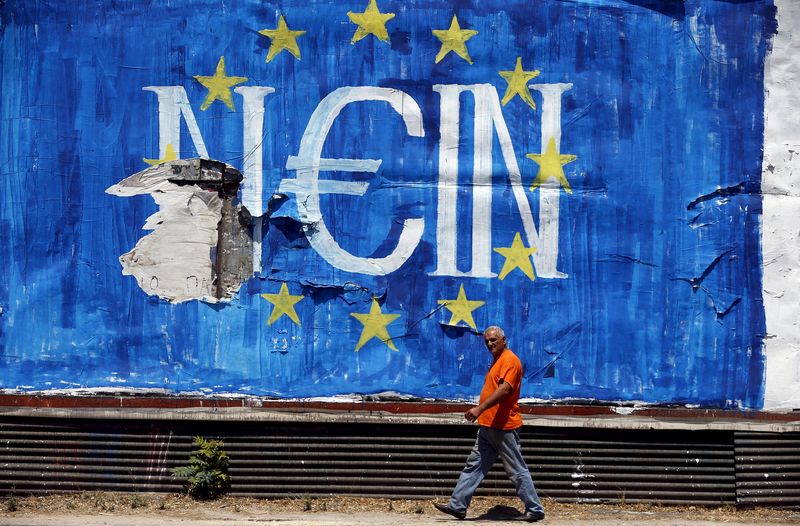By Jamie McGeever
LONDON (Reuters) - Greece just narrowly avoided crashing out of the euro but for sceptics the clock is already ticking on when large-scale default and exit from the "irreversible" euro club are raised once again.
When it is - be that in two months or two years - the lessons from Argentina are sure to be revisited.
Argentina's $100 billion (64 billion pounds) default in 2001 was the largest in history. It yanked the peso from its peg to the dollar and resulted in a 75 percent devaluation.
This shattered the economy. Real gross domestic product slumped 15 percent, inflation reached 40 percent, and household and business finances were crippled. To this day, the government remains cut off from international capital markets.
But, with the aid of serendipitous global economic conditions, Argentina's economy soon recovered.
So severe has been the recession in Greece since 2008 and so great are its debts, that some economists say Greece might be best served also crashing out of its currency union. Could a new drachma, 50 percent cheaper than the euro, be the catalyst for recovery?
"The parallels with Argentina are there. A broken banking system, an unsustainable debt, and the need to restore and enhance international competitiveness," said Barry Eichengreen, professor of economics and political science at the University of California, Berkeley.
"But there are reasons to think that reintroduction of the drachma and devaluation would do less for Greece than devaluation did for Argentina. Greece is less open, it exports less," he said.
The dollar's 30 percent rise over 1999-2001 made Argentina's exports uncompetitive on global export markets, especially when set against the currency collapse of neighbour and rival Brazil, and ultimately forced the central bank to break the dollar peg.
Greece's competitive problems are more deep-rooted. Not even the 40 percent collapse in wages since 2008 has lowered unit labour costs sufficiently to kick-start exports.
This begs the question, if an "internal" devaluation so large hasn't made Greece more competitive or boosted activity, why would an equally large "external" devaluation make any difference?
After all, if there's no demand and limited capacity to boost supply, it makes no difference to activity if a country's goods are cheaper because of lower wages or a lower currency.
Argentina, a major exporter of commodities, was lucky its currency collapsed just as the global commodity boom was taking off. This gave a huge positive terms-of-trade boost to domestic consumption and a major lift to exports.
"That's not going to be repeated for Greece," said Willem Buiter, chief global economist at Citi and co-author of a report in 2012 which introduced the term 'Grexit'.
"It is a much more closed economy, and it has absolutely no hope of getting carried along on a tourism and shipping equivalent of Argentina's global commodity super cycle."
MIND THE OUTPUT GAP
But recent history suggests large-scale devaluations often do eventually get a pick-up in growth.
Russia's real GDP expanded by 40 percent in the five years following the rouble's 75 percent devaluation in 1998, South Korea's grew by 30 percent in the five years following the won's 45 percent fall in 1997, and Argentina's grew by 25 percent.
Similar but less pronounced trends were seen in Mexico, Malaysia and Thailand following their respective devaluations in 1994, 1997 and 1997, according to Capital Economics.
"You shouldn't downplay the negative shock in the first year after devaluation. It would be big," said Andrew Kenningham at Capital Economics.
"But there would almost certainly be a period of very rapid growth and recovery in employment. In Argentina, employment started growing within the year, and that would probably happen in Greece."
Also even if Greece were to leave the euro it would in all likelihood stay in the European Union, meaning it would continue to be a net recipient of financial aid.
But more importantly, its "output gap" - the difference between actual and potential growth - could accelerate any rebound.
The larger the output gap ahead of a major devaluation, the bigger the recovery. And Greece's output gap is huge at around 13 percent, the Organisation for Economic Co-operation and Development calculates.
Greece's economy showed tentative signs of stopping the rot last year, but months of acrimonious negotiations over its bailout since Syriza swept to power in January have plunged it back in recession.
Debt as a proportion of the overall economy will nudge 200 percent, according to the International Monetary Fund, and many observers reckon it will never be paid back in full.
Something has to give.

"Years from now, will Europeans look back and say we extended the bailout for Greece for too long?" said Mickey Levy, member of the U.S. Shadow Open Market Committee and co-author of a 2012 paper "Greece's predicament: Lessons from Argentina".